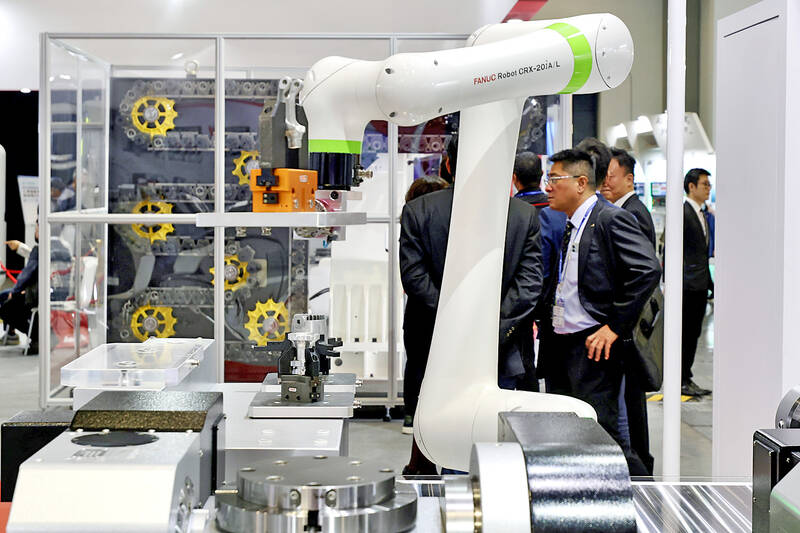Taiwan’s industrial production last month rose 5.07 percent from a year earlier, as local technology firms benefited from strong demand for electronic components used in artificial intelligence (AI) and high-performance computing applications, the Ministry of Economic Affairs said yesterday.
Industrial production measures the change in the value of output produced by the local manufacturing, mining and utilities sectors.
Last month, the industrial production index was 96.31, with manufacturing output — which accounted for 95.29 percent of the industrial production index — rising 5.29 percent to 96.4, up for the 11th consecutive month to the second highest in history, it said.

Photo: Ritchie B. Tongo, EPA-EFE
The strong showing came as robust demand for AI and high-performance computing applications, and big data centers offset fewer working days linked to the Lunar New Year, Department of Statistics Deputy Director-General Huang Wei-chieh (黃偉傑) said.
Within the technology space, electronic components output increased 16.67 percent year-on-year, while production in the IC sector surged 22.92 percent to an all-time high, the ministry said.
The rapid growth was the result of a sustained expansion in 12-inch wafer foundry production, as US technology giants showed keen demand for chips used in high-performance computing and AI applications, it said.
As AI grows increasingly prevalent and demand for Web-based services rises, more investment would flow to the semiconductor industry, it said.
That explained why the production index for computer, electronics and optical products rose 14.78 percent to a record high, indicating that local AI server suppliers operated during the Lunar New Year holiday to meet demand, the ministry said.
While tech firms thrived, non-tech companies took a hit from reduced working days, low-price competition from overseas and production maintenance, it said.
Output for basic metals, chemicals and fertilizers, machinery equipment, and vehicles and auto parts all fell, with annual decreases of 2.1 to 27.2 percent, it said.
AI-driven demand is expected to lend further support to technology products, Huang said, adding that this month’s manufacturing production index is forecast to grow between 18.6 and 23.7 percent.
For the first two months of the year, growth is expected to range from 11.4 percent to 13.8 percent, meaning that the seasonal weakness in the first quarter might not be conspicuous, Huang said.
Non-tech products could also contribute with their slowdown stabilizing, the ministry said.
However, Huang declined to speculate on the timeline of recovery for non-tech sectors, saying it would depend on when the spillover effect of China’s overproduction ends.

Anna Bhobho, a 31-year-old housewife from rural Zimbabwe, was once a silent observer in her home, excluded from financial and family decisionmaking in the deeply patriarchal society. Today, she is a driver of change in her village, thanks to an electric tricycle she owns. In many parts of rural sub-Saharan Africa, women have long been excluded from mainstream economic activities such as operating public transportation. However, three-wheelers powered by green energy are reversing that trend, offering financial opportunities and a newfound sense of importance. “My husband now looks up to me to take care of a large chunk of expenses,

SECTOR LEADER: TSMC can increase capacity by as much as 20 percent or more in the advanced node part of the foundry market by 2030, an analyst said Taiwan Semiconductor Manufacturing Co (TSMC, 台積電) is expected to lead its peers in the advanced 2-nanometer process technology, despite competition from Samsung Electronics Co and Intel Corp, TrendForce Corp analyst Joanne Chiao (喬安) said. TSMC’s sophisticated products and its large production scale are expected to allow the company to continue dominating the global 2-nanometer process market this year, Chiao said. The world’s largest contract chipmaker is scheduled to begin mass production of chips made on the 2-nanometer process in its Hsinchu fab in the second half of this year. It would also hold a ceremony on Monday next week to

TECH CLUSTER: The US company’s new office is in the Shalun Smart Green Energy Science City, a new AI industry base and cybersecurity hub in southern Taiwan US chip designer Advanced Micro Devices Inc (AMD) yesterday launched an office in Tainan’s Gueiren District (歸仁), marking a significant milestone in the development of southern Taiwan’s artificial intelligence (AI) industry, the Tainan City Government said in a statement. AMD Taiwan general manager Vincent Chern (陳民皓) presided over the opening ceremony for the company’s new office at the Shalun Smart Green Energy Science City (沙崙智慧綠能科學城), a new AI industry base and cybersecurity hub in southern Taiwan. Facilities in the new office include an information processing center, and a research and development (R&D) center, the Tainan Economic Development Bureau said. The Ministry

ADVERSARIES: The new list includes 11 entities in China and one in Taiwan, which is a local branch of Chinese cloud computing firm Inspur Group The US added dozens of entities to a trade blacklist on Tuesday, the US Department of Commerce said, in part to disrupt Beijing’s artificial intelligence (AI) and advanced computing capabilities. The action affects 80 entities from countries including China, the United Arab Emirates and Iran, with the commerce department citing their “activities contrary to US national security and foreign policy.” Those added to the “entity list” are restricted from obtaining US items and technologies without government authorization. “We will not allow adversaries to exploit American technology to bolster their own militaries and threaten American lives,” US Secretary of Commerce Howard Lutnick said. The entities